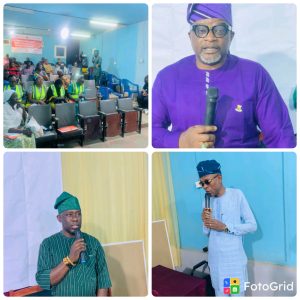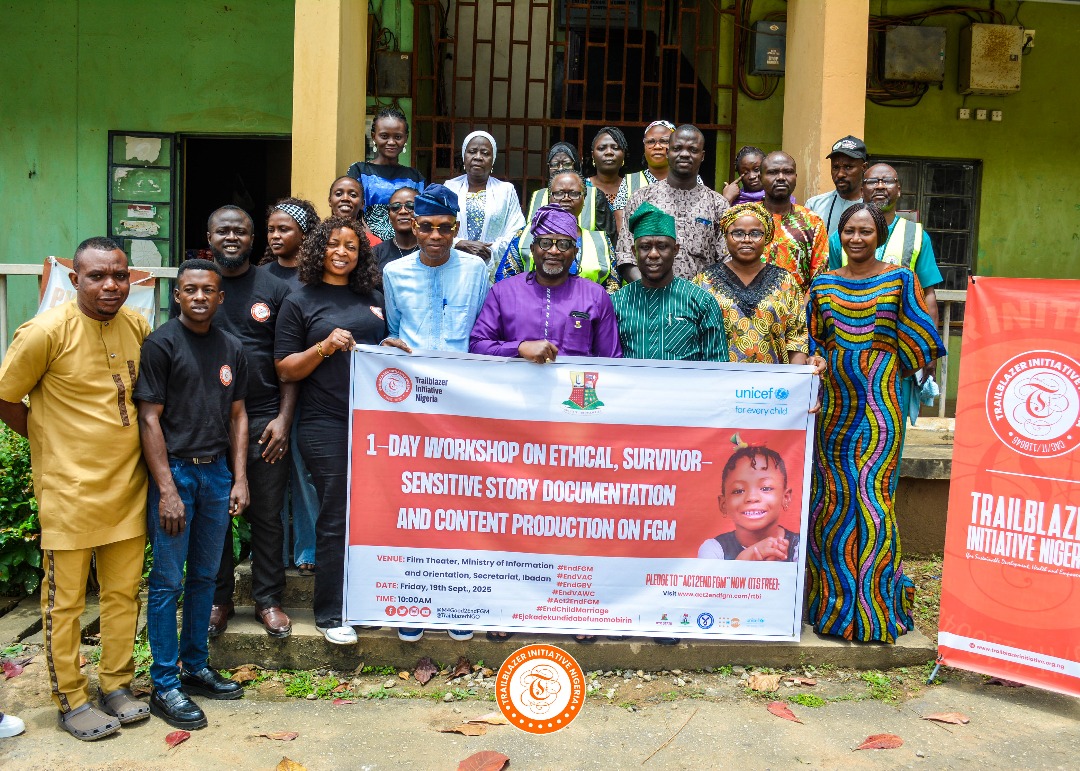Civil society organizations (CSOs), media practitioners, and government agencies have renewed calls for stronger ethical and survivor-sensitive reporting in the campaign to eliminate Female Genital Mutilation (FGM) in Oyo State.

The appeal was made at a capacity-building workshop on ethical content production, organized by Trailblazer Initiative Nigeria in collaboration with the United Nations Children’s Fund (UNICEF) and the Oyo State Government. The meeting brought together journalists, CSOs, and advocacy groups to bridge existing gaps in documenting FGM cases and strengthening advocacy efforts.
Executive Director of Trailblazer Initiative Nigeria, Dr. Dare Olagoke Adaramoye, emphasized the central role of the media in shaping public opinion and driving social change.
“The media has been doing a lot in sensitization and awareness creation, but gaps still exist in protecting survivors and preventing re-traumatization,” he said. “This workshop was designed to equip stakeholders with tools to develop survivor-centered stories and document FGM cases ethically.”
Adaramoye explained that survivor-sensitive reporting is crucial in ensuring dignity, confidentiality, and accurate documentation, which in turn helps build public trust and encourages survivors to speak out.
Citing findings from the 2021 Knowledge, Attitude and Practices (KAP) study, Adaramoye described Oyo as one of the states with the highest prevalence of FGM in Nigeria.
According to the report, Kajola Local Government Area has a prevalence rate of 98 percent, followed by Oyo West with 86 percent, and the Ibarapa zone with 76 percent.
“This is outrageous when converted into numbers, given the population of Oyo State. It underscores the urgency for collective action to intensify elimination efforts,” he said.
Adaramoye also urged Nigeria’s elites to reject the cultural justification of FGM, insisting that harmful traditions should not be preserved in the name of heritage.
“Not every cultural practice is beneficial. FGM is harmful, and the elites must lead by abandoning and speaking against it,” he added.
Delivering a goodwill message, Mr. Babalola Rotimi, Permanent Secretary at the Oyo State Ministry of Information, described the initiative as timely, noting that while legislation against FGM exists in the Southwest, enforcement remains weak.
“We have laws, but implementation is the challenge. Too often, perpetrators go unpunished. This program strengthens collaboration among CSOs, media, and law enforcement to ensure accountability,” he said.
Representative of National Orientation Agency (NOA), Mrs. Abidemi Adewale also pledged to intensify grassroots mobilization through its community orientation officers stationed across all local governments. The agency noted that while awareness is growing, FGM continues to thrive in several rural communities.
Other speakers, including Mrs. Adeola Adewole, who presented on ethical reporting, as well as Dr. Babatunde Tiamiyu and Dr. John Oluwafemi Olla, representing the media and CSO community respectively, highlighted the importance of confidentiality, informed consent, and trauma-informed interviewing in FGM advocacy.
They pointed out that harmful reporting practices such as exposing survivors’ identities or using sensational headlines can stigmatize victims and undermine community trust, while ethical storytelling can empower survivors and inspire communities to abandon the practice.
During the workshop, participants were trained on best practices in survivor-sensitive reporting, ethical use of visuals in advocacy, and balancing facts with advocacy without sensationalism. Case studies of both positive and harmful reporting were presented, illustrating how media coverage can either support or hinder the fight against FGM.
At the end of the workshop, stakeholders agreed that sustained collaboration between media houses, CSOs, and government agencies remains essential in shifting attitudes, protecting survivors, and ensuring effective implementation of anti-FGM laws.
They further committed to promoting content that is survivor-centered, culturally sensitive, and solution-driven, with the overall goal of accelerating the elimination of FGM in Oyo State.

